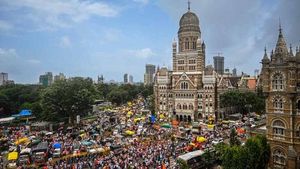After the recent devastation from Hurricane Milton, Florida is grappling with significant gas shortages, creating widespread disruptions at fuel stations. Days after this fierce storm hit, numerous gas outlets throughout the state are running dry, with the Tampa area particularly hard hit; nearly half the stations there remain without fuel.
For those lucky enough to locate operational gas stations, the experience is anything but pleasant. Long lines stretch out, and tensions run high, occasionally resulting in altercations among furious drivers competing for the dwindling fuel supplies. Thankfully, relief efforts are underway, with shipments of gasoline expected to reach Tampa within days. Even so, experts warn it could take several additional days before the situation stabilizes.
According to reports, about 17.3% of Florida's gas stations were without fuel on Monday afternoon, representing progress from the previous day's figure of 33.2%. The timeline improved especially for the Tampa metro area, where the percentage of stations lacking fuel diminished from 87.5% to 49.9%. This marked the first time the number dropped under 50% since the aftermath of the storm began.
Florida’s fuel supply chain heavily relies on Port Tampa Bay for deliveries from Gulf Coast refineries, accounting for over 43% of the state’s gas, diesel, and jet fuel. The port has faced operational hiccups, with limited vessel movements and delays caused by the storm's aftermath contributing to fuel shortages. Currently, it’s reported over 30 million gallons of fuel are stuck, waiting to be offloaded and reach desperate gas stations.
Your average frustrated Florida driver is not just facing long waits at gas stations; local authorities, including the Pasco Sheriff’s Office, have urged patience, as many struggles continue, including violence. Disputes and even fistfights among desperate customers trying to secure gas have been documented, underscoring the heightened stress levels due to the shortages.
To tackle the crisis, Florida Governor Ron DeSantis has taken decisive steps, speeding up fuel distribution efforts through highway patrol escorts for fuel tanker trucks. The state has also launched public fuel sites, providing free gas, but these sites have seen overwhelming demand—some drivers reported waiting for hours just to fill their tanks.
The current fuel shortages expose the fragility of Florida’s supply chain, particularly when natural disasters strike. The surge in demand as residents braced for the hurricane overwhelmed the existing “just-in-time inventory” system, resulting in significant outages. Experts predict improvements are on the horizon, but the continuity of fuel supply must be re-evaluated to withstand future natural disasters effectively.
Meanwhile, as struggles at gas stations continue, election officials are working hard to maintain normalcy amid the disruptions caused by the hurricanes. With less than three weeks to the elections, residents still have their civic duty to vote. But many polling locations have shifted due to the storm impacts, leaving some voters guessing where to cast their ballots.
Julie Marcus, Pinellas County’s supervisor of elections, announced the relocation of 25 polling places due to the damage inflicted by Hurricanes Helene and Milton. Early voting is set to begin shortly. Marcus highlighted the importance of keeping voting processes running smoothly, emphasizing the need for accessible and secure local elections, even under challenging circumstances.
“Voting is in our DNA—it’s the fabric of who we are,” Marcus stated emotionally as she addressed the pressing need for the community to come together at this difficult juncture. She recognized how the storms have forced her office to implement contingency plans to minimize disruptions, enabling polling locations to remain accessible.
The number of polling sites has only dropped slightly, maintaining familiarity and logistics to support voter turnout. Eight of the relocated sites are based in St. Petersburg, whilst others are scattered throughout southern locales like Gulfport and South Pasadena, making locations accessible. To streamline voting processes, Marcus's office is ready to assist voters as needed. Providing comprehensive information is key to moving forward.
On the national policy front, the aftermath of the hurricanes intersects with the broader conversation on abortion access amid significant challenges. One Florida woman found herself stuck following Hurricane Milton, having already visited Planned Parenthood North Tampa just one day before the storm struck. With mandatory waiting periods, she anxiously awaited access for her second appointment, only to find the clinic powerless to operate after losing power due to the storm.
“That’s no longer just about strict regulations; it makes the situation incredibly dire when unforeseen events complicate already stringent laws,” said Dr. Chelsea Daniels, who works at Planned Parenthood. With recently imposed restrictions leaving women with minimal timeframes to access services, the impact of devastating storms on clinics is more pronounced than ever.
Dr. Daniels emphasized, “We are living under arbitrary regulations made even harsher during moments of crisis like this.” With hurricanes impacting already complex scenarios for abortion care, women are forced to navigate roadblocks preventing access to necessary services.
These hurricanes exacerbated the already precarious situation by disrupting transport routes, compelling women to seek care from farther away clinics—often tight on time due to regional restrictions on abortion access, especially after six weeks of pregnancy.
According to Dr. Daniels, many patients typically become aware of their pregnancy too late under current laws, with expected timelines constraining their options severely. Rainfall and flooding must be factored, too: many women are left without resources, forced to redirect those who are desperate for help.
Planned Parenthood’s multiple clinics all faced closure after Milton's devastation struck, but as recovery efforts have progressed, some facilities are once again opening their doors. Yet, the Paula R. Brady and North Tampa locations remain down, leaving numerous women scrambling to make last-minute logistical arrangements to get care elsewhere.
“We have been working closely to alleviate the burden on our clients, but events—the very storms—have been crushingly burdensome for patients,” Barbara Zdravecky, CEO of Planned Parenthood Southwest and Central Florida, relayed to The Independent.
The fallout from these natural disasters spans beyond just physical locations; patients without reliable transportation now face increased barriers to access. Multiple clinics are temporarily closed; others are desperately working to reroute appointments and provide necessary care. Even if some clinics are back to servicing patients, delayed timelines have pushed many toward financial limits, many borrowing funds to receive care as monetary stress dictates overwrought calculations.
For many affected, complications continue as they navigate financial strains and logistical hurdles, leaving activists and healthcare providers advocating for more consideration of how natural disasters affect reproductive healthcare access. Funding groups like Tampa Bay Abortion Fund are trying to bridge gaps for those relying on their support. This storm season puts demand high on assistance and raises questions about how these struggles will be amplified when the weather turns desperate.
At the same time, policymakers and administrators face increasing pressure to keep the vote alive even under socioeconomic pressures. Reports indicate many displaced voters will not have current access to voting records or locations, adding weariness as communities mentally prepare for upcoming elections.
Election officials are racing against the clock to address the impact of Hurricane Milton on upcoming voting efforts, reforming strategies to secure voter participation and alleviate disenfranchisement. Low voter turnout has historically swayed elections, and the consequences of these storms could highly influence outcomes.
Among hurricanes helming turbulent conversations about governance and climate change, impacts on voting policies are urgent, raising questions of how and if voters can access their rights to participate. Warnings of potential outcomes loom large particularly as candidates rally for attention, vying for the confidence of voters stripped of amenities due to natural disasters. Combined forces of weather and economic strife expand this complexity as officials seek solutions to accurately reflect the voice of citizens amid engaged and displaced communities.



